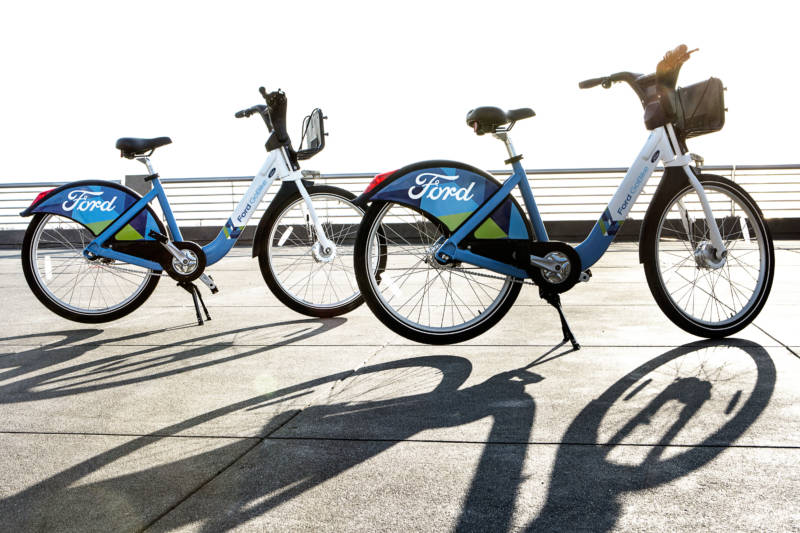Ford CEO Mark Fields also announced the company was acquiring private shuttle-bus operator Chariot, with plans to expand beyond the Bay Area to five additional markets by 2018. It is also creating a "City Solutions" team that will work with cities on "expanding mobility efforts with key cities worldwide."
"To some, this might seem like a bit of a departure," Fields said. "The truth is this is what we were born to do ... the goal is to drive down the cost of mobility so no one gets left behind."
The irony that an auto company would sponsor bike share, with its corporate logo emblazoned on the rear fenders of the sturdy blue, white and green bikes, garnered mixed reactions from bike advocates and on social media. But many were excited to see the expansion of bike share move forward.
Cycling "is the fastest-growing form of transportation in our city, and this is going to allow expansion of a bike-share system that's going to bring the joy and affordability of bicycling to all parts of San Francisco," said Brian Wiedenmeier, executive director of the San Francisco Bicycle Coalition.
Motivate is required to place 20 percent of the new bike stations in "communities of concern," and a discounted bike share membership will be offered to low-income riders.
"It's great to hear our elected officials, MTC, Motivate and Ford, all emphasize the reality that we cannot leave anyone behind as we charge ahead with tech-driven transportation solutions," said Clarrissa Cabansagan, the senior community planner at TransForm. "It's even more refreshing to hear such an iconic American car company recognize that it can be a catalytic force in undoing the sins of the auto industry like pollution, traffic congestion and physical inactivity."
One local transportation advocate was more skeptical of Ford's involvement and said the company's goal is still to sell cars.
"It's their play towards promoting the privatization of new, green, 'sharing' transportation systems that should be public," said Jason Henderson, a geography professor at San Francisco State University who has written about the politics of mobility.
"Ford, Google, Uber and an array of other large tech companies want to appear altruistic and hip, when ultimately, their vision remains that the car, driverless or whatever, stays king," Henderson said.
It took almost three years for officials to secure a corporate sponsor to fund the expansion of the Bay Area's bike-share system. Similar financial models to fund bike share are used in other U.S. cities, including New York's Citi Bike, sponsored by Citibank, and Portland's BIKETOWN, sponsored by Nike.
Although Ford has begun experimenting with electric bikes and other bicycle-related technologies, company officials say they are not interested in manufacturing bicycles.
